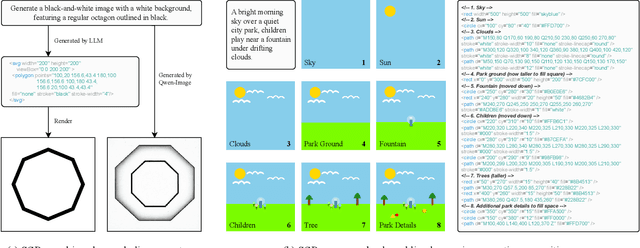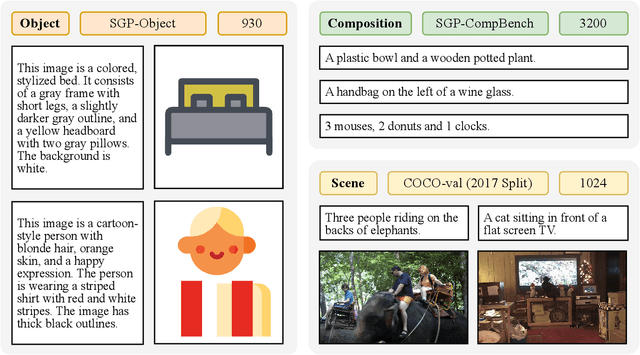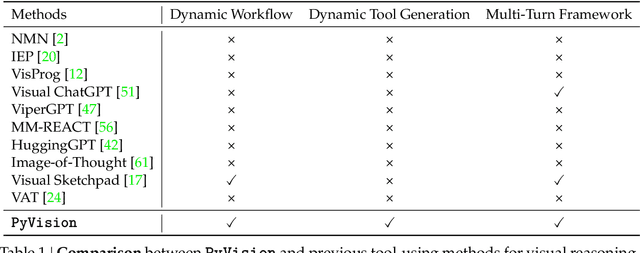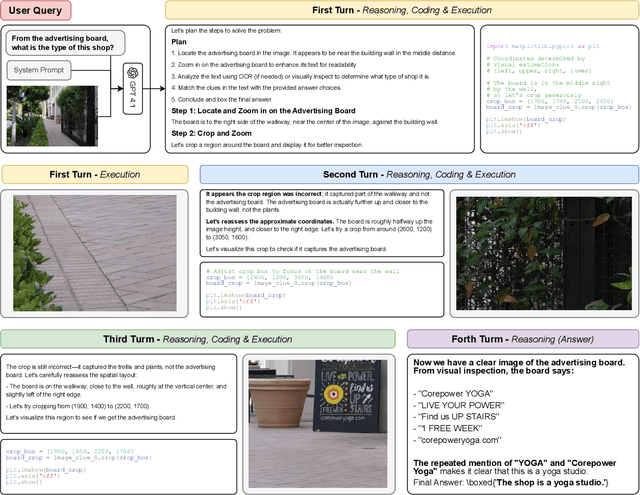Haoquan Zhang
Symbolic Graphics Programming with Large Language Models
Sep 05, 2025



Abstract:Large language models (LLMs) excel at program synthesis, yet their ability to produce symbolic graphics programs (SGPs) that render into precise visual content remains underexplored. We study symbolic graphics programming, where the goal is to generate an SGP from a natural-language description. This task also serves as a lens into how LLMs understand the visual world by prompting them to generate images rendered from SGPs. Among various SGPs, our paper sticks to scalable vector graphics (SVGs). We begin by examining the extent to which LLMs can generate SGPs. To this end, we introduce SGP-GenBench, a comprehensive benchmark covering object fidelity, scene fidelity, and compositionality (attribute binding, spatial relations, numeracy). On SGP-GenBench, we discover that frontier proprietary models substantially outperform open-source models, and performance correlates well with general coding capabilities. Motivated by this gap, we aim to improve LLMs' ability to generate SGPs. We propose a reinforcement learning (RL) with verifiable rewards approach, where a format-validity gate ensures renderable SVG, and a cross-modal reward aligns text and the rendered image via strong vision encoders (e.g., SigLIP for text-image and DINO for image-image). Applied to Qwen-2.5-7B, our method substantially improves SVG generation quality and semantics, achieving performance on par with frontier systems. We further analyze training dynamics, showing that RL induces (i) finer decomposition of objects into controllable primitives and (ii) contextual details that improve scene coherence. Our results demonstrate that symbolic graphics programming offers a precise and interpretable lens on cross-modal grounding.
MDK12-Bench: A Comprehensive Evaluation of Multimodal Large Language Models on Multidisciplinary Exams
Aug 09, 2025Abstract:Multimodal large language models (MLLMs), which integrate language and visual cues for problem-solving, are crucial for advancing artificial general intelligence (AGI). However, current benchmarks for measuring the intelligence of MLLMs suffer from limited scale, narrow coverage, and unstructured knowledge, offering only static and undifferentiated evaluations. To bridge this gap, we introduce MDK12-Bench, a large-scale multidisciplinary benchmark built from real-world K-12 exams spanning six disciplines with 141K instances and 6,225 knowledge points organized in a six-layer taxonomy. Covering five question formats with difficulty and year annotations, it enables comprehensive evaluation to capture the extent to which MLLMs perform over four dimensions: 1) difficulty levels, 2) temporal (cross-year) shifts, 3) contextual shifts, and 4) knowledge-driven reasoning. We propose a novel dynamic evaluation framework that introduces unfamiliar visual, textual, and question form shifts to challenge model generalization while improving benchmark objectivity and longevity by mitigating data contamination. We further evaluate knowledge-point reference-augmented generation (KP-RAG) to examine the role of knowledge in problem-solving. Key findings reveal limitations in current MLLMs in multiple aspects and provide guidance for enhancing model robustness, interpretability, and AI-assisted education.
PyVision: Agentic Vision with Dynamic Tooling
Jul 10, 2025



Abstract:LLMs are increasingly deployed as agents, systems capable of planning, reasoning, and dynamically calling external tools. However, in visual reasoning, prior approaches largely remain limited by predefined workflows and static toolsets. In this report, we present PyVision, an interactive, multi-turn framework that enables MLLMs to autonomously generate, execute, and refine Python-based tools tailored to the task at hand, unlocking flexible and interpretable problem-solving. We develop a taxonomy of the tools created by PyVision and analyze their usage across a diverse set of benchmarks. Quantitatively, PyVision achieves consistent performance gains, boosting GPT-4.1 by +7.8% on V* and Claude-4.0-Sonnet by +31.1% on VLMsAreBlind-mini. These results point to a broader shift: dynamic tooling allows models not just to use tools, but to invent them, advancing toward more agentic visual reasoning.
AI Idea Bench 2025: AI Research Idea Generation Benchmark
Apr 19, 2025Abstract:Large-scale Language Models (LLMs) have revolutionized human-AI interaction and achieved significant success in the generation of novel ideas. However, current assessments of idea generation overlook crucial factors such as knowledge leakage in LLMs, the absence of open-ended benchmarks with grounded truth, and the limited scope of feasibility analysis constrained by prompt design. These limitations hinder the potential of uncovering groundbreaking research ideas. In this paper, we present AI Idea Bench 2025, a framework designed to quantitatively evaluate and compare the ideas generated by LLMs within the domain of AI research from diverse perspectives. The framework comprises a comprehensive dataset of 3,495 AI papers and their associated inspired works, along with a robust evaluation methodology. This evaluation system gauges idea quality in two dimensions: alignment with the ground-truth content of the original papers and judgment based on general reference material. AI Idea Bench 2025's benchmarking system stands to be an invaluable resource for assessing and comparing idea-generation techniques, thereby facilitating the automation of scientific discovery.
MDK12-Bench: A Multi-Discipline Benchmark for Evaluating Reasoning in Multimodal Large Language Models
Apr 08, 2025Abstract:Multimodal reasoning, which integrates language and visual cues into problem solving and decision making, is a fundamental aspect of human intelligence and a crucial step toward artificial general intelligence. However, the evaluation of multimodal reasoning capabilities in Multimodal Large Language Models (MLLMs) remains inadequate. Most existing reasoning benchmarks are constrained by limited data size, narrow domain coverage, and unstructured knowledge distribution. To close these gaps, we introduce MDK12-Bench, a multi-disciplinary benchmark assessing the reasoning capabilities of MLLMs via real-world K-12 examinations. Spanning six disciplines (math, physics, chemistry, biology, geography, and information science), our benchmark comprises 140K reasoning instances across diverse difficulty levels from primary school to 12th grade. It features 6,827 instance-level knowledge point annotations based on a well-organized knowledge structure, detailed answer explanations, difficulty labels and cross-year partitions, providing a robust platform for comprehensive evaluation. Additionally, we present a novel dynamic evaluation framework to mitigate data contamination issues by bootstrapping question forms, question types, and image styles during evaluation. Extensive experiment on MDK12-Bench reveals the significant limitation of current MLLMs in multimodal reasoning. The findings on our benchmark provide insights into the development of the next-generation models. Our data and codes are available at https://github.com/LanceZPF/MDK12.
 Add to Chrome
Add to Chrome Add to Firefox
Add to Firefox Add to Edge
Add to Edge